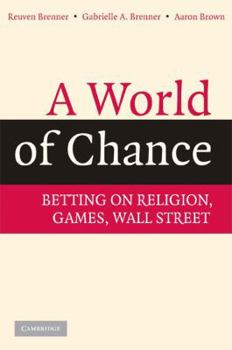A World of Chance: Betting on Religion, Games, Wall Street
Select Format
Select Condition 
Book Overview
Although financial markets often try to distance themselves from gambling, the two factors have far more in common than usually thought. When, historically there were no financial institutions such as banks, lotteries constituted the ways by which expensive items were disposed of, and governments raised money quickly. Gambling tables fulfilled roles that venture capital and banking do today. "Gamblers" created clearinghouses and sustained liquidity...
Format:Paperback
Language:English
ISBN:0521711576
ISBN13:9780521711579
Release Date:August 2008
Publisher:Cambridge University Press
Length:358 Pages
Weight:1.15 lbs.
Dimensions:1.0" x 6.0" x 9.0"
Customer Reviews
1 rating
Economists argue to legalize gambling
Published by Thriftbooks.com User , 15 years ago
This (rather unhelpfully titled) book discusses gambling from an Economics viewpoint, and argues three main theses. That traditional moralistic objections to gambling are misguided. That all forms of gambling should be treated as ordinary businesses -- private rather than governmental, regulated and taxed no more stringently than any other private business. That zero-sum (fair) gambling with a small chance of a big gain, which academics usually regard as irrational (for reasons of risk-aversion and concave utility function) is explainable under a "leapfrogging" model in which people care about relative economic status. The style is at the serious end of the "popular science" spectrum, a little too weighty for pleasant bedtime reading, but (aside from a mathematical appendix) perfectly understandable by an educated reader without needing any specific technical background. Much of the book deals with history, from the 20th and earlier centuries, of gambling practices: how laws on gambling were influenced overtly by cultural and ethical views (and covertly by vested business interests) in different countries and periods, and what were the economic effects of these laws. This historical discussion, used to support their arguments for contemporary policy, is quite differently focussed and much more detailed than most "popular science" style books treating the history of risk or chance, e.g. Against the Gods: The Remarkable Story of Risk and Chances Are: Adventures in Probability. Part of the book discusses empirical evidence to refute the traditional moralistic concerns about gambling: statistically, gamblers behave as responsibly in other affairs as non-gamblers, and big lottery winners typically do not fritter away their winnings. I found the factual material to be both interesting and informative. As for any book arguing a thesis, the arguments need to be read critically. It's written from what one might call the Economist magazine view of the world, which I tend to share, so I am predisposed to agree with the authors' theses, but let me try to engage it critically anyway. The authors correctly point out that gambling involving small stakes and small rewards (slot machines, poker, sports betting) is just a form of entertainment, so the existence of a thicket of laws restricting this particular form of entertainment is bizarre. They note the clearly desirable risk-taking that drives economic growth in a free market society, from the hands-on entrepreneur starting a physical business to the familiar financial spectrum of venture capital, IPOs, and secondary markets (i.e. Wall Street) to which speculators, who as individuals are acting as gamblers, have the desirable effect of adding liquidity. But they are implicitly arguing there is some meaningful connection between entertainment gambling and liquidity provision in more tangible markets. Despite their collection of cute historical stories ("poker banks" in the settlement of the southe






